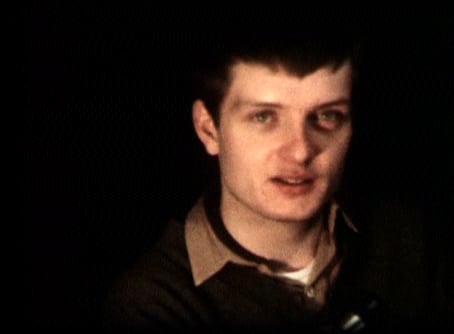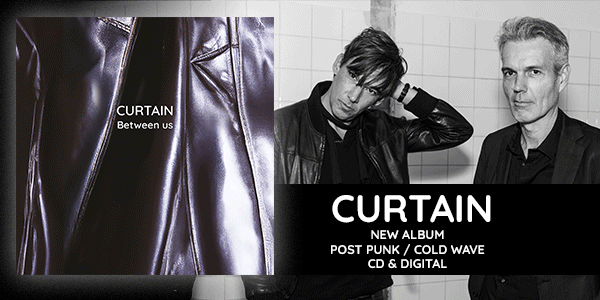To celebrate Ian Curtis, we at Post-Punk.com transcribed the above BBC Blackburn interview, which is one of the few recordings of Ian being interviewed. To the surprise of many, when Ian discusses shopping for records, one band that comes to mind for him happens to be Bauhaus, which he seemingly thought were from London.
(Note: Bauhaus had only 2 singles out at the time of this interview, which were “Bela Lugosi’s Dead”, and “Dark Entries”—so it is likely Ian had just heard of them. Soon after this interview, Ian would go see Bauhaus live while in London during the “Closer” studio sessions and would become an even bigger fan of the Northampton band).
Here is the full transcription below with some modifications for clarity:
WHAT SORT OF RELATIONSHIP DO YOU HAVE WITH OTHER MANCHESTER BANDS?
We tend to be pretty isolated now really…apart from the Factory groups. We have a lot to do with the other groups on Factory. We tend to play a lot of gigs with them and … there’s other things like erm the Durutti Column LP – the sandpaper sleeve – we stuck that on. So everyone there, with each other, and groups they got booked with, groups like the Buzzcocks, that we knew when we started really. You know when we sort of see them, we talk to them, but it’s not very often. We’d like to, you know, see a lot more of other Manchester groups. Any other groups in general.
WHAT DO YOU THINK OF THE STATE OF NEW WAVE?
Don’t know. I think it’s, a lot of it tends to have lost its edge really. There’s quite a few new groups that I’ve heard.. odd records. Record or have seen maybe such as, eh, I like, I think it’s mostly old Factory groups really, I like the groups on Factory; A Certain Ratio and Section 25. I tend not to listen, when I’m listening to records, I don’t listen to much new wave stuff, i tend to listen to the stuff I used to listen to a few years back but sort of odd singles. I know someobody who works in a record shop where I live and I’ll go in there and he’ll play me “have you heard this single?” singles by er the group called The Tights, so an obscure thing … and a group called, I think, er Bauhaus, a london group, that’s one single. There’s no one I completely like that I can say “well I’ve got all this person’s records. i think he’s great” or “this group’s records” it’s just, again, odd things
DO YOU HAVE ANY PLANS OF GIGGING OUTSIDE THIS COUNTRY?
We’ve played in Europe already in Holland and Germany and we are going to America. We’re only going for er, I think they wanted us to go for about 3 months or so [laughs] , but we’re only going for about about 2 weeks, 3 weeks, and Rough Trade will probably be organising that. I think we’re going with Cabaret Voltaire. I like them, they’re a good group [laughs], I forgot about them. Yeah but, we tend to do what we want really. We play the music we want to play and we play the places we want to play. I’d hate to be on the usual record company where you get an album out and you do a tour, and you do all the Odeon,s and all the this that and the others. I couldn’t just do that at all. We had experience of that supporting the Buzzcocks. It was really soul destroying, you know, at the end of it. We said we’d never tour … and we’ll never do a tour I don’t think – or if we do it won’t be longer than about two weeks.
WHAT IS YOUR SORT OF RELATIONSHIP WITH FACTORY RECORDS
It’s very good sort of friends everyone knows each other it’s all 50:50. Everything’s split.
DOESN’T IT IT SEEM A BIT INSULAR SORT OF BEING IN THE FACTORY SORT OF SET UP?
Don’t know. I suppose to somebody looking at it from the outside i suppose it is really
I mean you’re not pressurised into having to sign … like you know get a normal record company – they’re always looking for the next group for the next big thing … you know … to bring the record sales in and for them to promote and everything…but Factory just sign who they want to, put records by who they want to out, package it how they want to, you know, how they like doing it. It’s just run like that. You might get sort of a spurt of 3 singles out – you might not see anything for the next 6 months. You know. I like the relationship.
YOU HAVE A COUPLE OF TRACKS ON THE THIRD FAST EARCOM, WAS IT? OR IS IT THE SECOND FAST EARCOM?
Yeah. It’s the second one, yeah.
HOW DID YOU GET INVOLVED WITH FAST? AN EDINBURGH COMPANY?
Yeah, it was when we started playing; we played a few dates with The Rezillos. Bob Last was their manager at the time and he talked then about setting up a record label. And he wanted us to do a single for them. But due to Factory coming along and other things – he did things with Gang of 4 and The Human League first and got tied in in a sort of management way with The Human League – I think he manages another one – it never came about. When we were doing the album we had quite a few tracks left over; we recorded 16 in all and just cut 10 and our manager, Rob Gretton, had talked to him about certain things and we’d always sort of kept in touch. He mentioned his idea for Earcom and we just offered him the 2 tracks to put out on that. Cos we like to get everything we record out one way or another, like we’ve done the Earcom, we’re doing the Sordide Sentimental thing, which are a French limited edition magazine-cum-record thing. There are two tracks on that that will be coming out that won’t be on an album or a single. It’s just that we like getting, you know, as much stuff out as we can, really. In some form or another. You know, it’s often hard with Factory because obviously they’re limited financially. I mean you can’t just put out a record, you know, when you’ve got other things planned. So with no room on the LP, we tend to look for other outlets for them, really. See what we can do.
WHERE DO YOU SEE OR WHERE DO YOU FEEL YOU WANT JOY DIVISION TO END OR GO TO?
I just want to carry on the way we are, I think. Basically we want to play and enjoy what we like playing. I think when we stop doing that I think, well, that will be the time to pack it in. That’ll be the end.
*Ian Curtis would later go out of his way to see Bauhaus during the Closer recording sessions.
Here is an excerpt from Bauhaus bassist David J’s book Who Killed Mr. Moonlight? Bauhaus, Black Magick and Benediction where he recounts meeting Ian Curtis:
“This colourful and seedy area of London became the backdrop to our residency at Billy’s in Dean Street. The dingy little club was a seething cauldron for the witches’ brew that would eventually be labelled ‘goth’ and would soon host the infamous Batcave nights. During the course of our five shows at the venue, we saw the audience evolve and establish its own code, in terms both of dress and attitude.
Black was of course the only way to go: the colour of night and death, and always the distinguishing mark of those who wished to stand outside of the norm, from existentialists to beatniks to goths. It is the flag of morbidity under which the anarchic troops of apolitical revolt rally before storming the barricades of convention.
The nineteenth-century decadents believed that it required a highly refined sensibility to truly appreciate and savour the delights of sensual sadness and the beautiful phosphorescence of decay. The goths would no doubt agree. In their disdain for the vulgar and their celebration of all that is wan, delicate, and slowly dying, they were and still are the true descendants of those poets of exquisite unease.
On one of those rainy Soho nights, we were visited by an icon of this as-yet-unnamed melancholic subculture when Ian Curtis appeared at the end of a set during which a wild and abandoned Murphy had laid waste to a wall of mirrors. We had always felt that there was a sympathetic resonance between Joy Division and us. The tall, gangly singer told us that he had come with Factory Records boss Tony Wilson, who had apparently left after the first number as he strongly objected to bands that wore makeup.
‘It were ’is fooking loss, man,’ he told us. ‘He really missed out tonight. Fook him. He’s a cunt, anyway!’
Ian said he thought the gig was great, that both our singles were excellent, and that he had been hoping that Joy Division’s recent recording sessions (for Closer) would coincide with one of our live shows.
Many years later, I would get chills when reading of this desire in Ian’s own hand, in a letter to his mistress, Annik Honore, a copy of which had been lent to me (with the rest of Ian’s letters) by Michael Stock, the screenwriter and would-be director of an early biopic about Ian. Although Ian was cheery and warm that night at Billy’s, I remember a look in his watery blue eyes that was so sad and haunted. Three months later, he hung himself in his kitchen.
On May 3, we played a gig at the Russell Club in Manchester. Joy Division bassist Peter Hook was there, helping us load out our gear as he often would. After we had packed up, we went out with Peter and his manager, Rob Gretton. The band had recently released a limited edition single on the Sordide Sentimentale label consisting of ‘Atmosphere’ on one side and ‘Dead Souls’ on the other. It was only available in France, so I had been unable to find a copy. I mentioned this to Rob, and he very kindly said that he would send me one. It turned up on my doormat, two weeks later, the day after Ian’s death.
I had never heard ‘Atmosphere’ before. I slipped the seven-inch out of the beautiful, elaborate sleeve, which featured a painting of hooded monks on a mist-shrouded mountain by the artist Jean-François Jamoul. There was also a striking photograph of the band by Anton Corbijn. In light of the tragedy, the majestic track was almost unbearably poignant. With some trepidation, and a tear in my eye, I called Rob to thank him and to commiserate over the terrible news. He could hardly speak.”-David J Haskins
For more stories like this, read: Who Killed Mr. Moonlight? Bauhaus, Black Magick and Benediction
Transcription of Ian Curtis interview helped by the fine ear of Iain Johnson (many thanks Iain!)
















 Or via:
Or via: